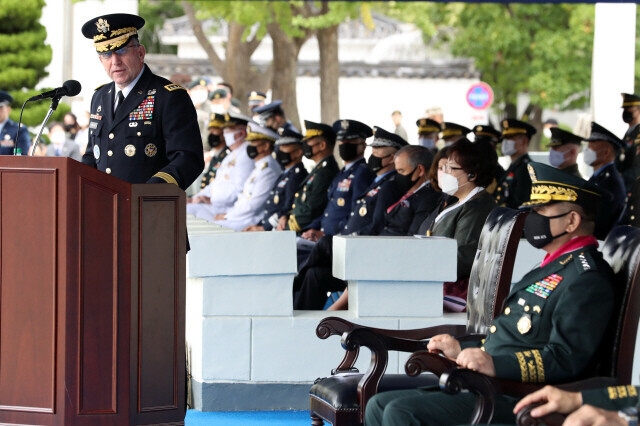hankyoreh
Links to other country sites 다른 나라 사이트 링크
[Editorial] Gen. Abrams’ remarks betray America's unilateralism in Korea

On Saturday, former US Forces Korea Commander Gen. Robert Abrams made disparaging remarks about the South Korean military, saying that it was “behind” on the capabilities it needs to regain wartime operational control (OPCON). His remarks were quite presumptuous.
He also said that a response to China would need to be added to the combined operational plan that South Korea and the US agreed to update early this month.
It is exceedingly dangerous to demand that South Korea play a front-line role in the military containment of China at a time when military tensions are rising between Washington and Beijing.
South Korean Ministry of National Defense spokesperson Boo Seung-chan made no attempts to mask his displeasure during a regular briefing Monday, stressing that the remarks were “merely his personal opinion” and commenting that “we can’t know the intention” behind them.
Referring to the necessary conditions for the OPCON transfer in an interview with Voice of America, Abrams stressed that South Korea “must acquire a strategic strike capability and develop and field a Korean integrated air and missile defense capability.”
“And that one, frankly, we’re furthest behind on,” he added. His message was that wartime OPCON cannot be returned to the South Korean military because it doesn’t have the capabilities to independently prevent a North Korean nuclear missile strike.
Abrams, who served as commander of USFK, the ROK-US Combined Forces Command, and the UN Command from November 2018 to July 2021, was critical of South Korea’s reluctance to amend the operational plan to beef up the response against China. He also insisted that Chinese military aircraft incursions into Korea’s air defense and identification zone (KADIZ) need to be addressed in the operational plan.
If that kind of response were to be included in the plan, it would require South Korea and the US to basically treat China as a common enemy, and to explicitly include things like the deployment of CFC bases and the destruction of strategic Chinese military targets in the operational plan and as a focus of exercises.
In the interview, Abrams noted that South Korea did not agree to his proposals as USFK commander in 2019 and 2020 to draft a new Strategic Planning Guidance (SPG) for revision of the operational plan. Commenting on the approval of a new SPG for revisions at the South Korea-US Security Consultative Meeting on Dec. 2, he explained that it was the result of current US Secretary of Defense Lloyd Austin taking a very firm position with South Korea as a dialogue partner.
He also raised issues with the recent downscaling of South Korea-US joint exercises, while arguing that rushing to issue a declaration officially ending the Korean War could lead to questions over whether the UNC is necessary anymore.
The Chosun Ilbo and other conservative news outlets gave Abrams’ interview remarks large-scale, uncritical coverage, while condemning the Moon Jae-in administration’s pursuit of an end-of-war declaration and the downscaling of South Korea-US joint exercises.
Abrams’ remarks were focused solely on the US’ strategic interests while ignoring South Korea’s position as an ally.
As recently as 2006, the US government under then-President George W. Bush was calling for an OPCON transfer by 2009, concluding that the South Korean military had sufficient capabilities. Now the US is taking a different line and insisting that the South Korean military isn’t up to snuff.
This seems to reflect its conclusion that the South Korean military will need to play a role in containing China amid Washington and Beijing’s battle for dominance. Even if that is the case, the US’ first step should be to resolve the difference in opinions while respecting South Korea’s position.
They must not forget that unilateralism will only do damage to the values underpinning the alliance.
Please direct questions or comments to [english@hani.co.kr]

Editorial・opinion
![[Editorial] Penalties for airing allegations against Korea’s first lady endanger free press [Editorial] Penalties for airing allegations against Korea’s first lady endanger free press](https://flexible.img.hani.co.kr/flexible/normal/500/300/imgdb/original/2024/0502/1817146398095106.jpg) [Editorial] Penalties for airing allegations against Korea’s first lady endanger free press
[Editorial] Penalties for airing allegations against Korea’s first lady endanger free press![[Editorial] Yoon must halt procurement of SM-3 interceptor missiles [Editorial] Yoon must halt procurement of SM-3 interceptor missiles](https://flexible.img.hani.co.kr/flexible/normal/500/300/imgdb/child/2024/0501/17145495551605_1717145495195344.jpg) [Editorial] Yoon must halt procurement of SM-3 interceptor missiles
[Editorial] Yoon must halt procurement of SM-3 interceptor missiles- [Guest essay] Maybe Korea’s rapid population decline is an opportunity, not a crisis
- [Column] Can Yoon steer diplomacy with Russia, China back on track?
- [Column] Season 2 of special prosecutor probe may be coming to Korea soon
- [Column] Park Geun-hye déjà vu in Yoon Suk-yeol
- [Editorial] New weight of N. Korea’s nuclear threats makes dialogue all the more urgent
- [Guest essay] The real reason Korea’s new right wants to dub Rhee a founding father
- [Column] ‘Choson’: Is it time we start referring to N. Korea in its own terms?
- [Editorial] Japan’s rewriting of history with Korea has gone too far
Most viewed articles
- 1[Editorial] Penalties for airing allegations against Korea’s first lady endanger free press
- 2In rejecting statute of limitations defense in massacre case, Korean court faces up to Vietnam War a
- 3Historic court ruling recognizes Korean state culpability for massacre in Vietnam
- 4“Those souls can rest now”: Vietnam massacre survivor reacts to Korean court win
- 5Months and months of overdue wages are pushing migrant workers in Korea into debt
- 6[Editorial] Verdict on Korea’s massacre in Vietnam a first step in atonement
- 71 in 3 S. Korean security experts support nuclear armament, CSIS finds
- 8Ruling on Korean atrocity in Vietnam comes 23 years after Hankyoreh 21’s exposé
- 9[Interview] Continuing the fight for victims of civilian massacres during Vietnam War
- 10Korea’s atrocities in Vietnam, in the words of those who saw and survived them